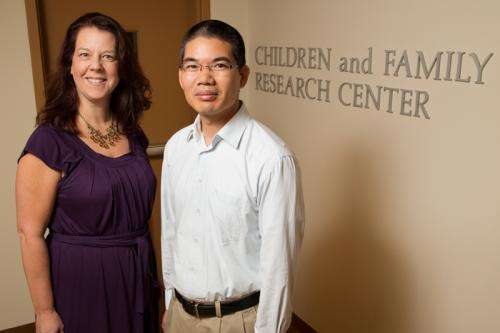Researchers identify factors that deter nonresident fathers from child involvement

Crime, gang activity and other problems of disordered neighborhoods decrease nonresident fathers' involvement with their children, but it doesn't have the effect on fathers who live with their children in two-parent households, a recent study indicates.
The findings are noteworthy because a number of federal and state initiatives seek to promote fathers' engagement with their children, and the study suggests that different factors may influence unmarried fathers' abilities or willingness to stay involved in their children's lives if they live apart.
Numerous studies have linked father engagement to a variety of positive outcomes for children, ranging from how often children eat vegetables to better social, psychological and behavioral development.
The researchers, Saijun Zhang and Tamara Fuller, both in the School of Social Work at the University of Illinois, compared data from 775 nonresident father families and 1,407 resident father families to explore whether fathers' supportive involvement in child care was affected by various characteristics of disordered neighborhoods. They also examined the influence of factors such as parents' relationship quality, their involvement with new partners, fathers' incomes and alcohol dependence.
"Father engagement in nonresident father families is a big concern, and there are many influential factors," said Zhang, who was the lead author on the study. "We should not only look at fathers' individual characteristics and the family environment that they create with the mothers, but also take community environment into account. The findings from our study suggest the importance of identifying potential barriers in the community environment and developing strategies to lower those barriers when designing programs aimed at promoting nonresident father engagement."
Children living apart from their fathers are more likely to live in communities with high rates of poverty and violent and illegal activities, conditions that have been found to adversely affect both child development and mothers' treatment of their children.
Neighborhood factors could be influencing men's engagement with their children in a variety of ways, Zhang said.
Crime and illegal activities in the children's neighborhoods could deter nonresident fathers from maintaining relationships with them, especially when the fathers have higher socioeconomic status than the mothers and live in better communities.
And community norms may define men's perceptions of paternal responsibility. If single-mother households are prevalent in the neighborhood, nonresident fathers may feel that it's acceptable to be less involved with their children.
Among resident father families in the study, men who were married to their children's mother were more highly involved with their children than were unmarried fathers.
And men who did not live in the same home but maintained romantic relationships or friendships with their children's mothers were more engaged with their children than men who had no attachment to the mothers.
"Our study only identifies disordered community environment as a barrier for nonresident father engagement," Zhang added. "It would be useful for future research to understand fathers' concerns that are related to disordered community environment and how such concerns discourage them from staying engaged with their families."
Because children who live without their fathers in the home are vulnerable to behavioral, psychological, substance abuse and other problems, connecting these families with alternative resources in the community is important for social support. Children also can benefit from interaction with unrelated adult males.
Social networking opportunities that enable single mothers to exchange support with other mothers in similar circumstances might be beneficial as well, Zhang said.
Although it was not the focus of the study, the researchers found that regardless of whether a father lived with his children, the primary determinant of paternal engagement was the quality of the parents' relationship – supporting the "package deal" theory that the parents' relationship with each other plays an important mediating role in the father's relationship with the child.
"Nonresident fathers and mothers need to develop and maintain a good relationship with one another for the children's well being because that is key for fathers to have ongoing interaction with the children," Zhang said.
Unlike prior studies, however, the current study did not find that unmarried fathers who lived apart from their children became less involved with them when the children's mothers had additional offspring with new partners.
The study appeared recently in the journal Family Relations.















